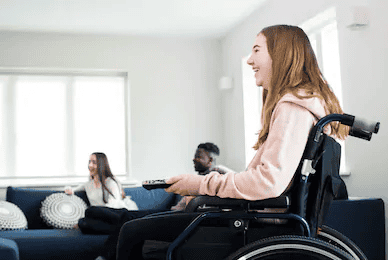What Resources and Services Are There for College Students with Disabilities?

|
Getting your Trinity Audio player ready...
|
The time leading up to a student’s first months at college can be both exciting and stressful.
From choosing where to go to school to securing funding to deciding what classes to take, there is a lot of uncertainty.
For individuals who have a disability, it can be even more complicated.
You May Like: America’s Top 50 Colleges for Student with Disabilities
Students with disabilities need to know what services and resources are available to them to ensure equal access to the curriculum and environment.
It is important to find out this information in advance, so you know what support you will receive before you are in the middle of a course with challenging assignments or activities.
Transitioning from High School to College
Under the Individuals with Disabilities Education Act, high school students with an Individualized Education Program (IEP) are entitled to transition support services.
An IEP is a legal document for students with disabilities who receive special education supports prior to college.
Transition supports provides students with guidance as they move from high school to college or to the workforce.

For instance, a staff member such as a career counselor or school counselor will work with the student to determine their plans for after high school and to set small goals to achieve them.
How are students with disabilities serviced in college?
By law, under the Office of Civil Rights, organizations that receive federal funding, such as academic institutions and employers, must provide students with disabilities equal benefits, services, and opportunities.
This is referred to as Section 504 of the Rehabilitation Act of 1973.
Students attending college must be provided with equal access to classrooms, and they may be deemed eligible for specific accommodations (e.g., note-taking services, extended time for tests).
The Office of Civil Rights (OCR), which is a part of the U.S. Department of Education, oversees the implementation of Section 504.
Who qualifies for section 504 in college?
Individuals with a physical or mental health condition that substantially restricts one or more major life activities (e.g,, caring for one’s self, performing manual tasks, walking, seeing, hearing, speaking, breathing, learning, and working) can qualify for a 504 plan.
Some examples of conditions that may qualify for a 504 in college include:
- Learning Disability
- Orthopedic Impairment
- Emotional Disability (i.e., depression, anxiety)
- Respiratory Condition
- Intellectual Disability
- Neurological Disability (i.e., ADHD, Autism, Cerebral Palsy)
- Hearing or Visual Impairment
- Traumatic Brain Injury
Do all US colleges honor 504 plans?
All public or private schools that receive federal funding are required under Section 504 of the Rehabilitation Act to make their programs accessible to students with disabilities.
For schools that do not receive federal funding, students with disabilities can receive accommodations under Title III of the Americans with Disabilities Act.
Who do you speak to at your school of choice?
It is important to find out in advance who handles disability issues at the college you will be going to and what needs to be done to get accommodations or access other resources.
This person or office might be part of the department referred to as “student services” or the”disability office.”
Accommodations to meet the students’ needs may include access to alternative testing sites, priority registration for classes, note-taking services, software that transmit speech to text and more.
What about students who may need assistive technology?
Students needing assistive technology such as wheelchairs, voice amplifiers, communication devices, and other tools may receive their equipment through their college under the Assistive Technology Act.

Here is an excellent resource by Understood.org with more information for students who may require assistive technology in college.
What can a student with a disability do if their academic needs are not being met in college?
If the student has any problems or concerns with the accommodations, courseload, etc. they should talk to the disability/student service office to find out what can be done.
If the situation is not resolved, and a student does not feel they are getting a fair and equal education, they are entitled to file a grievance to formally discuss the concerns.
Ask your college for the paperwork needed and the required steps to file a grievance should the situation arise.
For more information on how to file a grievance, see:
What about student loans and grants?
Students often worry about money for college, but fortunately, there are many sources of funding. Many people use a combination of savings, scholarships, grants and loans.
There are some scholarships and grants specifically for students with disabilities.
Students can also borrow money to pay for college from private lenders in addition to getting federal aid.
Private lenders can be found both online and offline, and they range from traditional sources of loans, such as banks, to online lenders who have worked hard to make the process of applying for a loan faster and easier.
Education and Behavior – Keeping Us On The Same Page







